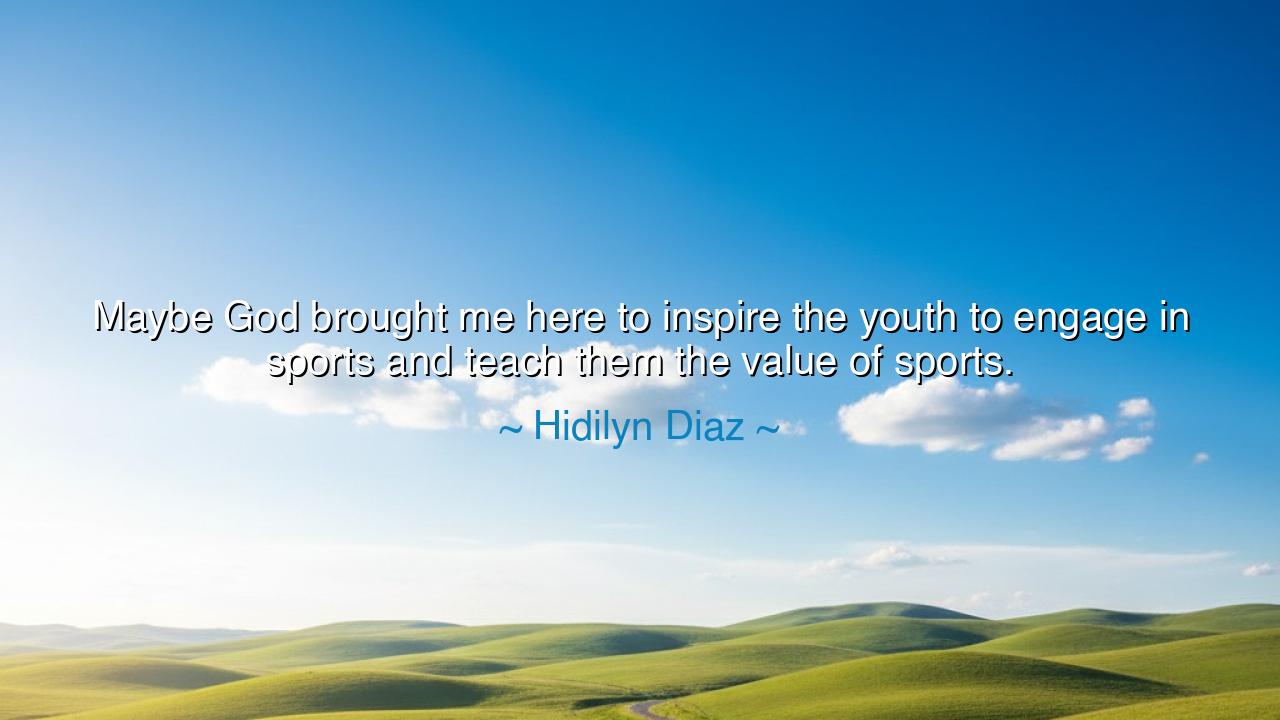
Maybe God brought me here to inspire the youth to engage in
Maybe God brought me here to inspire the youth to engage in sports and teach them the value of sports.






In the words of Hidilyn Diaz, “Maybe God brought me here to inspire the youth to engage in sports and teach them the value of sports.” This is no mere statement of achievement, but a reflection steeped in humility and purpose. For Diaz, the first Olympic gold medalist of the Philippines, did not see her triumph as her own alone, but as part of a greater design. In her words is the voice of one who recognizes that destiny is not merely for personal glory, but for service, for legacy, and for the shaping of generations yet unborn.
When she invokes God, she reaches beyond the realm of personal ambition into the realm of calling. The ancients would say that each soul is placed upon the earth with a task, a sacred duty. Some are born to rule, some to create, others to heal, and some to inspire. Diaz, having borne the weight of her nation’s hopes, perceives that her strength was given not only to lift barbells, but to lift the spirits of the youth who watch her. This is the deeper meaning of victory—not the medal, but the awakening of countless young hearts who now believe, “If she can, so can I.”
The value of sports that Diaz speaks of is not merely in strength of muscle or speed of limb. It is in discipline, in resilience, in the will to endure pain for the sake of triumph. It is in the lessons of failure, the humility of defeat, the shaping of character through repetition and struggle. In this sense, sports are a school of the spirit as much as of the body. Just as the ancient Greeks saw athletics as preparation for both war and citizenship, so too does Diaz see her calling as more than physical—it is moral, spiritual, and communal.
Consider the tale of Jesse Owens, who in 1936 stood in Berlin before a hostile world. His four Olympic gold medals were not merely medals—they were symbols, signs to the youth of his time that courage and dignity could overcome hatred and tyranny. Owens, like Diaz, might have thought at first that his triumph was personal. But in time, history revealed the truth: his victories were seeds of inspiration for millions. So too Diaz now understands that her strength must become nourishment for the dreams of her people.
There is also great humility in her words. She does not declare with certainty that she is chosen, but says, “Maybe God brought me here.” This “maybe” carries the weight of a soul aware of its own smallness before the vast design of the universe. And yet, in acknowledging this mystery, she embraces her role with reverence. The ancients would call this the balance between fate and choice: destiny places you on the path, but you must walk it with courage and awareness.
The emotional power of her statement lies in the way it transforms personal toil into communal blessing. What once was a struggle in solitude—a woman lifting impossible weight in training halls, sweating, crying, striving—becomes, in the light of victory, a beacon for children who may yet take up the barbell, the ball, the track, or the ring. She sees herself not as the end of a story, but as its beginning for others. In this, she teaches us the highest meaning of greatness: that it is never for oneself alone.
So, O listener, let the lesson be clear: whatever your triumphs, they are not yours to hoard. If you succeed, let your success be a light to others. If you endure hardship, let your endurance teach others the strength of perseverance. Like Diaz, see your achievements not as isolated victories, but as gifts entrusted to you for the sake of those who follow. Inspire the youth, for they are the future; teach the value of discipline, for it is the root of excellence; and acknowledge the hand of God, for it reminds you that your power is not yours alone.
Therefore, take this counsel into your life: live not only for your own ascent, but for the lifting of others. Whatever your craft, your art, your sport—make it a testimony. Be like Diaz, who in her strength found her purpose, and in her purpose found her people. For the truest victory is not to stand upon the podium, but to see generations rise because you once stood there.






AAdministratorAdministrator
Welcome, honored guests. Please leave a comment, we will respond soon